Update on Evil
YouGov kindly conducted some research on evil, inspired by my previous post:
https://today.yougov.com/topics/society/survey-results/daily/2025/08/21/c3e80/1
https://today.yougov.com/topics/society/survey-results/daily/2025/08/21/c3e80/2
https://today.yougov.com/topics/society/survey-results/daily/2025/08/21/c3e80/3
The sample size was 6893. All effects I report are very strongly significant. It goes without saying that there are conceptual difficulties here because we are measuring separate variation in both concepts of evil, and in past deeds, both reduced down to a single variable.
The main interesting results:
Men are more likely than women to think they’ve done something evil.
34% of men, versus 23% of women, say they have done something evil. Also, men are almost twice as likely to assess themselves as repeat offenders. 23% of men, versus 13% of women, say they’ve done evil multiple times.
Men commit a large majority of serious crimes. I think a perfectly likely interpretation of men’s greater propensity to report having done something evil is that men actually are more likely to have done evil, at least given a fairly natural and common marking out of what “evil” means. For example, if we construe evil as large, direct, non-accidental harm (not merely offence or disappointment) without justification to another, it is almost certainly true that far more men have done evil than women.
Personally, I think almost everyone has done something evil, as I argued in my previous piece. However, if you draw the line at violence, fraud, theft, etc., men are more likely to have crossed it. Another explanation: men may simply have a darker and starker worldview. There is a literature suggesting that women have better moral self-esteem than men, even while in general, men have better self-esteem than women.
Younger people are quite a bit more likely than older people to say they’ve done something evil.
I think differences between the young and the old here are probably driven much more by variations in conceptions of evil than by any variations in evil deeds.
The difference ramps up over the age groups. At both extremes:
33% of young respondents reported having done evil at some point in their lives. The corresponding figure for those 65+ was 22%. Not a huge gap, but quite appreciable.
There are a number of plausible explanations here. Firstly, young people grew up in an era of frequent controversies about the morality of particular individuals. For example, the sort of things described by “so you’ve been publicly shamed” by Jon Ronson, plus MeToo, “cancellations”, and so on. This environment forces you to confront the possibility that you, too, might be capable of evil. Secondly, young people seem to have a broadly depressive worldview. Recognising (even exaggerating) your own capacity for evil is part of depression. I think it is unlikely that young people have truly done more evil, although I suppose I can’t rule it out.
Age may temper. When you are young, your sense of the moral possibilities of humanity- not just humanity in the abstract, but humans you know- is smaller. As you grow older, you see more and more great evils done. This can make you indulgent of your own failings. Older people might also, in some cases, simply have forgotten what they’ve done or distorted the details in their own mind so as to no longer exceed the threshold of evil.
Remember that older people have had a longer period of time- more opportunities- to do something truly evil. Like all acts, once you’ve done an evil act, you can’t undo it. You can become a better person, but your deeds are still your deeds forever. Hence, if reports were accurate and there was no change between generations, we would expect older people to be substantially more likely to report they’d done something evil.
Younger people are also more cynical of other Americans’ morality
Young people are also much more likely to say that a lot of American adults- half or more of them- have done evil things. They are twice as likely to say this as the over 65+ bloc. This is one of the starkest differences in the results set.
Many of the explanations I gave above for why young people are more likely to see themselves as having done evil- depressive world view, moralised culture, the tempering of age- might explain this difference as well.
There also appears to be a tendency, albeit of modest size, for young people to say that people they know who have done evil things are not, despite that, all or even mostly evil. This is encouraging; it may indicate that a more nuanced understanding of good and evil is developing.
There are all sorts of other differences in the data set that are statistically significant, along the lines of politics, race, and region. However, my approach is to look for effects that are large enough to be of undeniable practical significance. None of them struck me as reaching that threshold. Let me know if you disagree in the comments.
Final thoughts- the 10%
I find it fascinating that 10% of the population appear to think they’ve done evil but only once. I would love to know their stories, and I would love to know the solitary act they performed that they think crossed the line.
I find their claim very unlikely. The concept of evil is immensely flexible; you can calibrate it how you like. However, setting a definition on which I had done evil but only once would be almost impossible for me. There are conceptions of evil on which I commit evil many times a day, there are conceptions of evil on which I have done scores of evil deeds, and there are high threshold conceptions of evil on which I have never done anything evil. I can’t imagine a concept of evil that would imply I’d done evil, but only once. I suspect the same is true for most others, and that many are deluding themselves. Still, I would love to know their stories.
If
could give me access to the underlying data, I could perform analyses like educational attainment v evil assessments, genderXage, ageXpolitics, genderXpolitics, and so on.


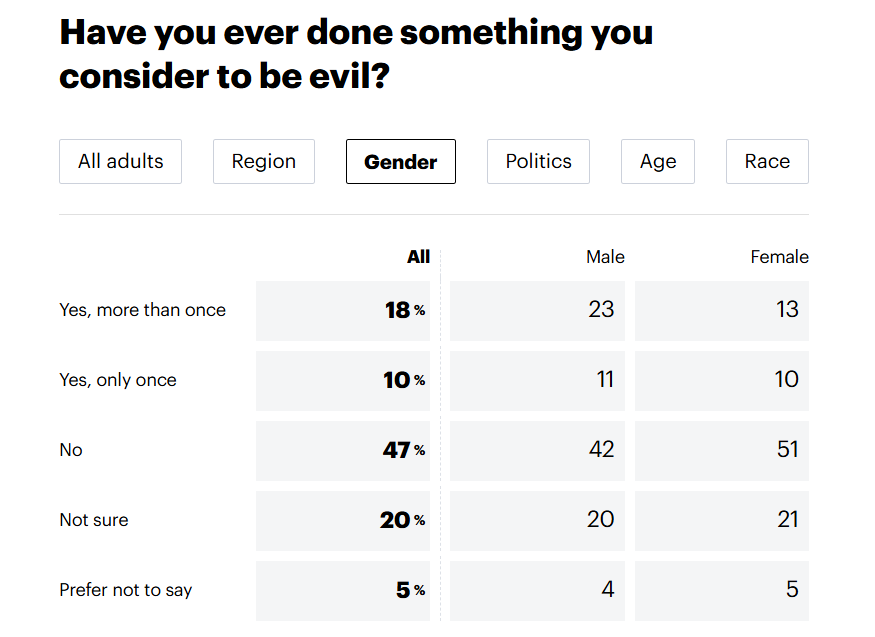
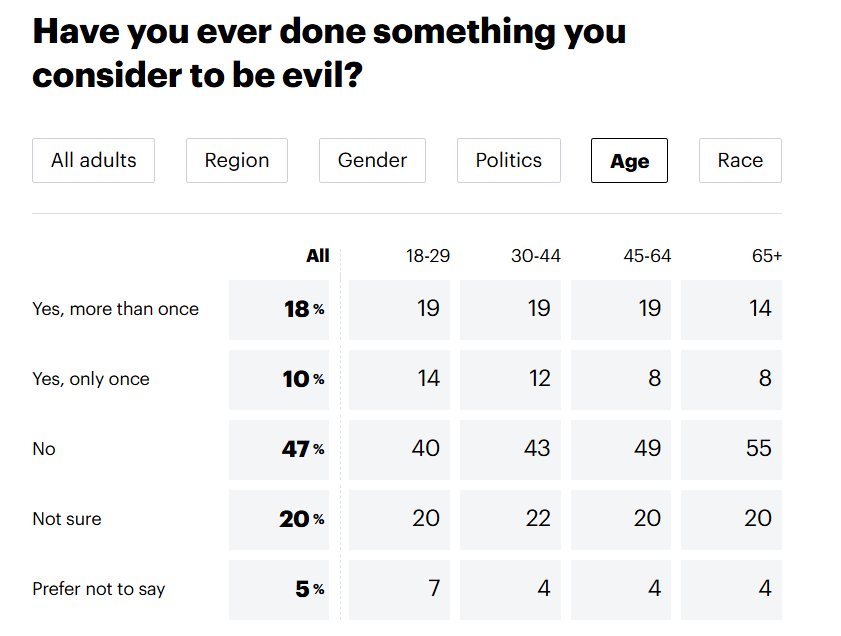
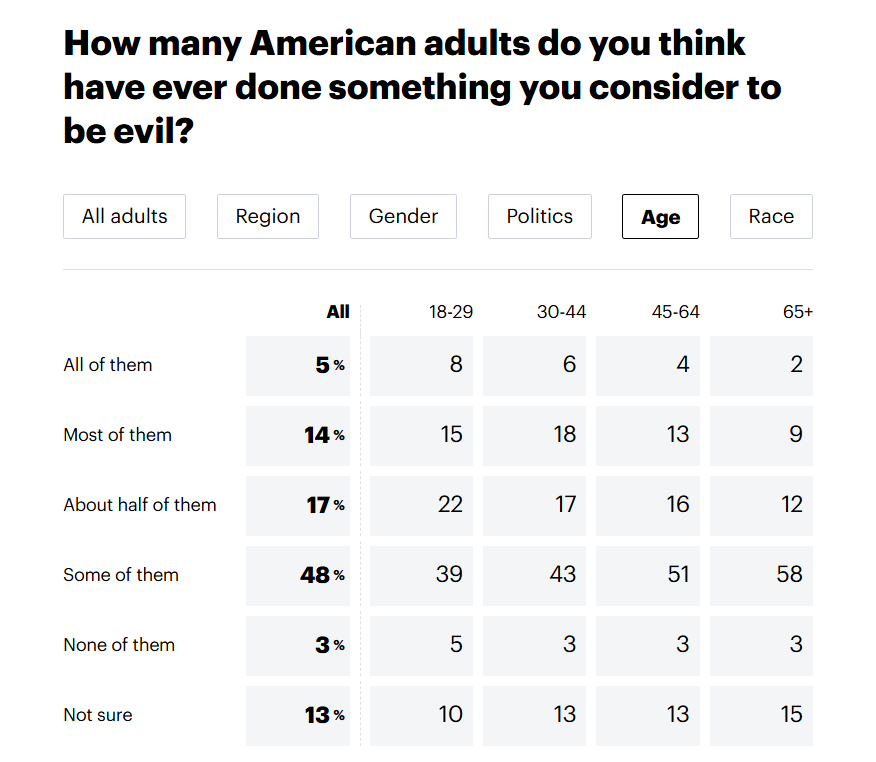
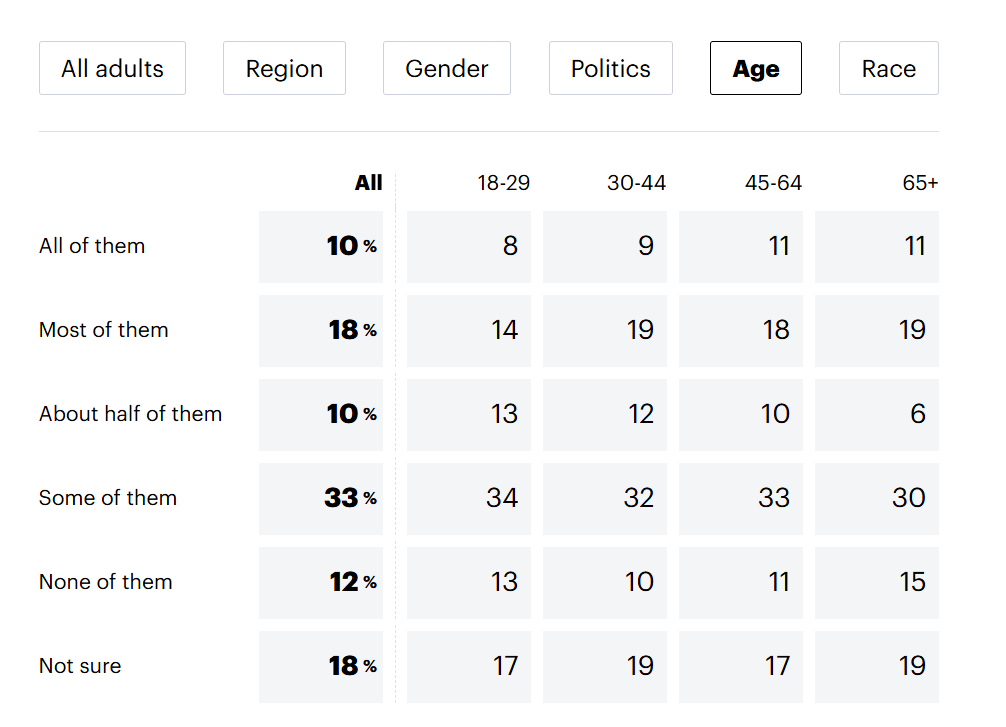
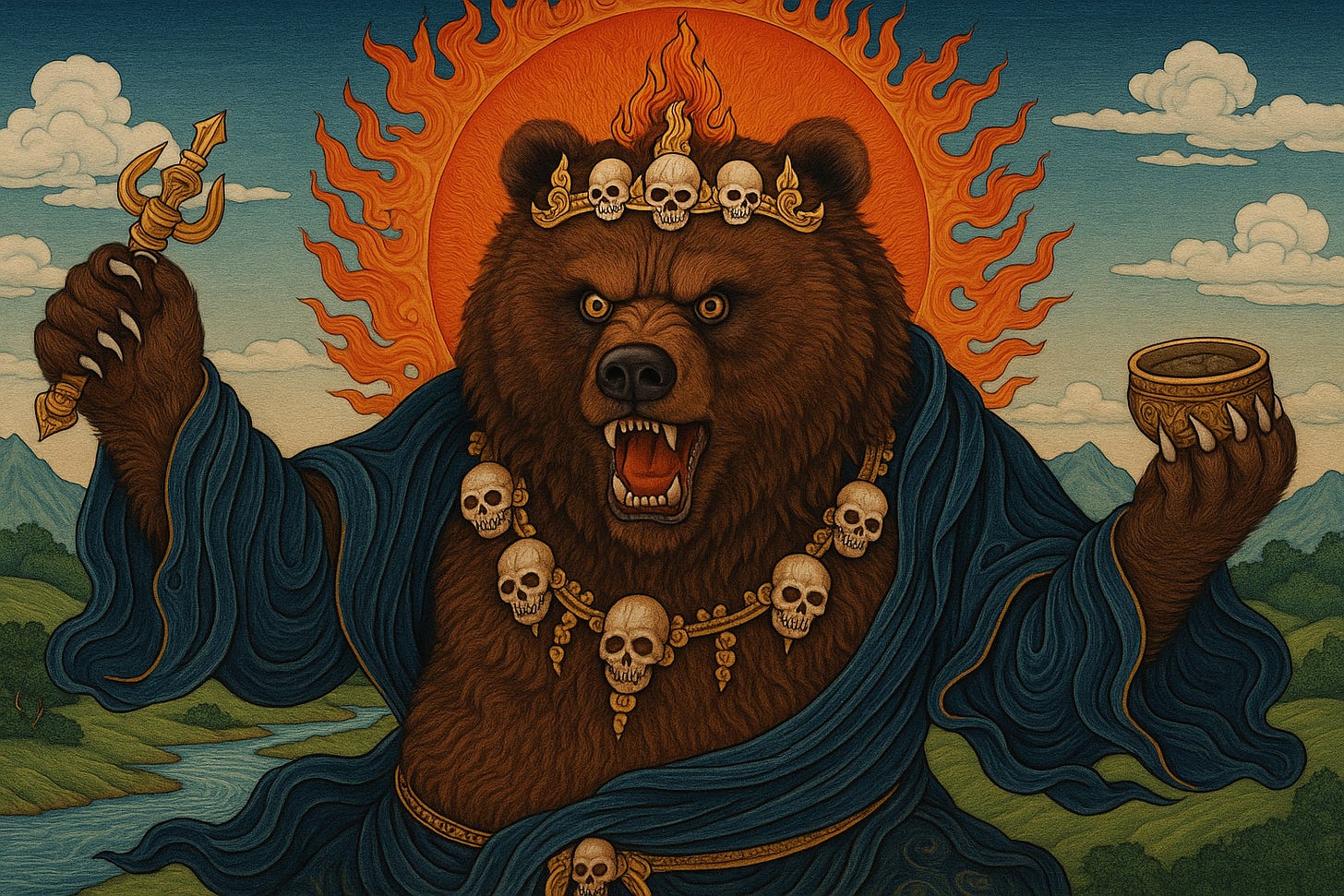
I'm a 25 year old female. I would say I've done evil once (using a loose definition of something that I couldn't easily live with having done). After several years of emotional abuse by my family, in my late teens, I hit my younger brother (early teens at the time), who participated gleefully in the abuse along with my mother, over the head with an iron laundry rack during a day of particularly bad treatment. He was knocked out briefly and had a concussion all night. I was suicidal with remorse over it and actually spent time afterwards researching suicide methods. Before the incident, I'd spent a lot of time cooking for, taking care of, and trying to aid in the moral development of said brother. After the incident I rarely spoke to him and we no longer have a relationship. I'm doing much better in general after leaving home and ceasing contact with most of my family.
Maybe the word evil is just too intense for many people? Something confined to colonial-era Puritans or horror films or comic book villains.
I was raised as a Fundamentalist Christian on the King James Bible, so perhaps "evil" is less extreme for me, closer to "morally wrong".
On my understanding, I've done many evil things, and so has everyone else I know well.
I wonder how people would answer if you used the criteria the Catholic Church uses to define mortal sins:
1) grave subject matter
2) full knowledge
3) deliberate consent